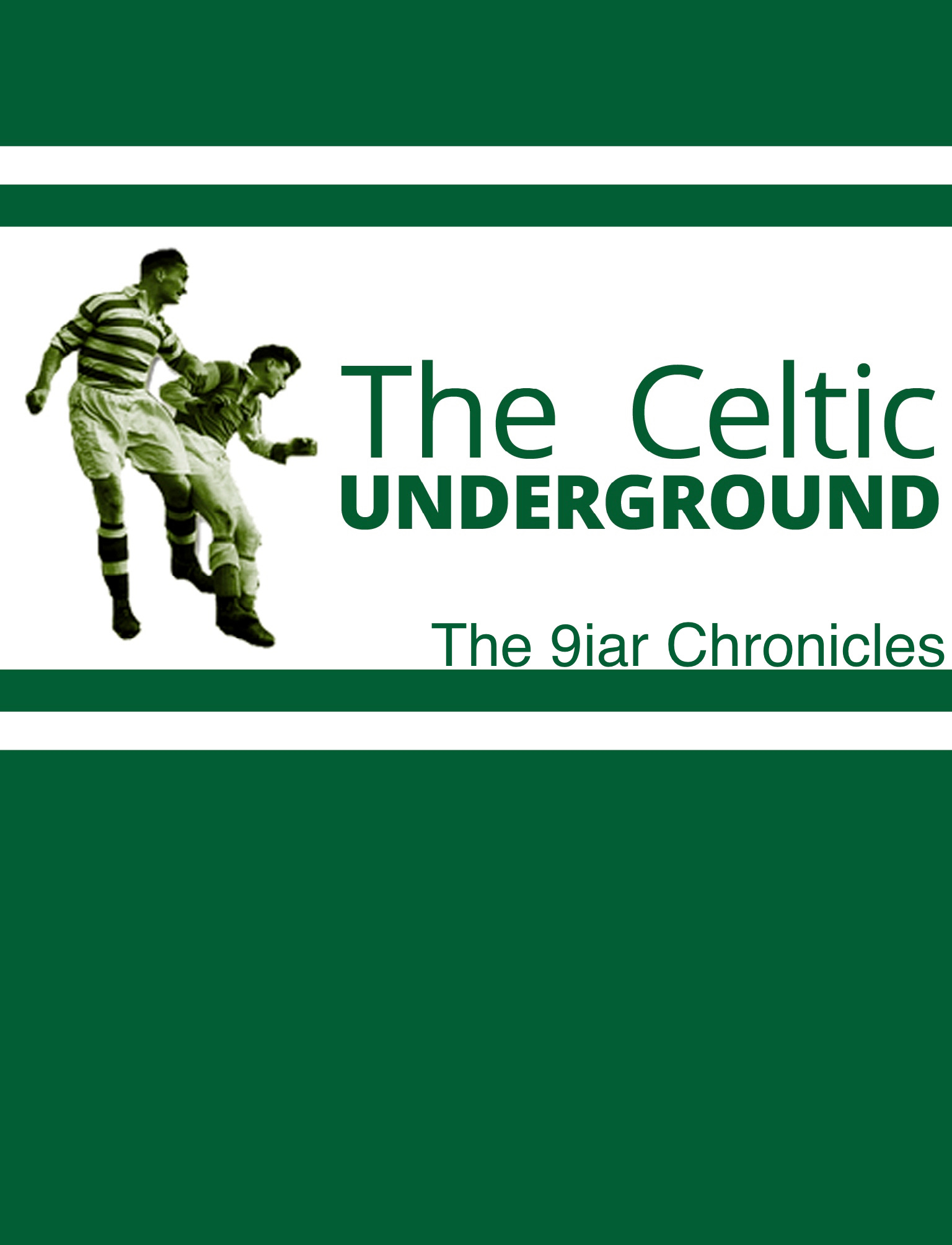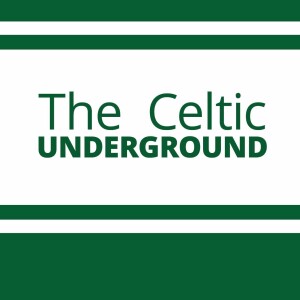
The 9iar Chronicles - Season not the ten 1974/75
Two Cups - but no Ten-in-a-Row
League Position – 3rd - finishing 11pts behind Rangers who won the League and 4pts behind HibernianLeague Cup – Winners
Scottish Cup – Winners
Drybrough Cup - Winners
European Cup - First Round
Celtic were to miss out on a world record of ten consecutive League championships this season and had to be content with the two domestic cups and the Drybrough Cup in it's last year. This season saw the retirement of Billy McNeill and the departure on free transfers at the end of the season of the last true veterans of the golden age with the release of Jimmy Johnstone and Jim Brogan. The only remaining Lisbon Lion at the end of the season was Bobby Lennox.
Celtic did not travel abroad for any pre-season games this season but used the Drybrough Cup and domestic friendlies to sort the team out. There was an embarrassing one-off trip to West Germany to play Schalke 04 in Gelsenkirchen which ended in the joint highest defeat under Jock Stein so far. Interest in the Drybrough Cup was faintly raised when the final threw Rangers and Celtic together with the game ending in a draw and Celtic winning the rights to the Cup 4-2 on penalties. This was the last season this Cup would be played though it would return in 1979. The performances were somewhat jaded and lacking in enthusiasm one normally expected from a Celtic team but this was put down to a short inter-season lay-off period with the World Cup and Scotland's involvement in that also taking place during the shut down. Added to this would be that Danny McGrain had returned from the World Cup having been diagnosed diabetic.
The League Cup saw Celtic in Group 4 with Motherwell, Dundee Utd and Ayr Utd. The format had been changed with one team qualifying from each group for the Quarter finals and the rather silly offside rule used in the Drybrough - only being offside beyond the 18 yard box - persisted with even though it was disliked by all. In the second game Celtic received a shock losing to Ayr Utd. The jaded performances were for real and Jock Stein found himself with three immediate problems :- a goalkeeping crisis, a vulnerable defense and the strike force misfiring. These all needed to be addressed. None could be addressed with immediate effect. Celtic, however, duly put the results together to qualify for the quarter finals with a game in hand in the Group Satge and were drawn against Hamilton Academicals managed by ex-Celt Eric Smith. A 2-0 win at home followed by a 4-2 away win saw them comfortably through to face Airdrie in the semi final. This was a turgid affair settled by a single goal from Stevie Murray in the second half. Hibernian had also made it through all the way and the final was a classic Celtic performance with Dixie Deans scoring a hatrick as well as Joe Harper also getting a hatrick and ending on the losing side.
That was one Cup in the bag done and dusted by the end of October. Already Celtic had seen George Connelly walk out and state that he was quitting football. He did relent and returned to train and eventually win a starting place again in November and December. But the assessment of the team had seen Jimmy Quinn, Vic Davidson, Jimmy Bone and Andy Lynch all told that they could leave on frees. Also by this time Celtic found themselves out of the European Cup at the first hurdle. A 1-1 draw at home achieved after the sending off of an Olympiakos player was not enough and in the flare and smoke of the Athens game Celtic went down 2-0.Olympiakos were an unfancied side and they duly made their own exit at the next round. Was this an indication of European fragility? The side that had won the big cup, made the semi final twice and had been described as European attack masters looked woefully out of sorts.
What happened in the League to lose the tenth successive title is really a continuation of the faults that had been seen at the start of the season being cruelly exposed in the second half in the New Year. By that point Ronnie Glavin had been signed after much beating around the fee from Partick Thistle. At the age of 23 he had been the Jags captain and leading player as well as a Scotland U-23 cap. Signed in November for a club record of £80,000, Glavin had been a target for a number of clubs and Partick Thistle, under manager and ex-Celt Bertie Auld were looking to cash in. Glavin arrived to add extra firepower and to help Dalglish who was turning out to be easily the most competent and rounded player in Scotland. After a successful scoring debut he found it not as easy as first thought to fit into the team and in January he found himself dropped as Stein wrestled to find a winning formula again.
The catalyst that started to bring the house tumbling down was the 3-0 loss to Rangers at Ibrox in January. Celtic did not play too badly but there were too many first team players that failed to hit form and this was worrying. With a further 4 points dropped in the next five games which included dispiriting draws away to Arbroath and at home to Dumbarton. With the goalkeeping crisis much in evidence Peter Latchford was recruited from West Bromwich Albion. Latchford came up and played in a Friendly and in wizard time he was duly signed on an initial loan deal and saw out the rest of the season as first choice keeper. At times the support and Jock Stein must have thought what they had taken on as Latchford was prone to the occasional howler and soft goal. But he would develop substantially from this his first season at Celtic. Despite trying everything the crisis could not be averted and Celtic would drop a further 13 points in 10 games to finish third behind Rangers and Hibernian. Needless to say this was a shock to the supporters who had come to see over the last 10 years the Championship as a permanent feature at Celtic Park and the League programme kicking off each season with the raising of a new Championship flag.
The reality was that the flow of players coming through had dried up. Though Dalglish was without doubt the most accomplished footballer in Scotland he could not do it all by himself. The midfield lacked a David Hay type player. George Connelly, whilst a gifted sweeper and defender as well as having exquisite skill, was now emotionally fragile. McNeill was reaching the end of his career as too was Jim Brogan. Add to that a lack of bite upfront, despite Paul Wilson having his best season ever, it was more a collective malaise within the strike force that saw them missing chances and playing underpar when before they had been the Green Machine.
The retrieval of the season came with the Scottish Cup winning 3-1 against Airdrie who were in their first Cup Final since 1928. By this point the League had already been lost so it was with absolute faith that Jock Stein sent them out onto the Hampden pitch knowing that they would return with the cup. At the end of that game Billy McNeill announced his retirement.
If the club felt low at having to bear the loss of the tenth successive League title then they could console themselves with two trophies at least. Things could not get worse. Could they?
Enjoy…
More Episodes
 2019-10-23
2019-10-23
 2019-10-05
2019-10-05
 2019-09-22
2019-09-22
 2019-09-19
2019-09-19
 2019-09-05
2019-09-05
 2019-08-31
2019-08-31
 2019-08-30
2019-08-30
 2019-08-22
2019-08-22
 2019-08-03
2019-08-03
 2019-07-31
2019-07-31
 2019-07-10
2019-07-10
 2019-07-08
2019-07-08
 2019-06-06
2019-06-06
 2019-05-28
2019-05-28
 2019-05-09
2019-05-09
 2019-04-27
2019-04-27
 2019-04-23
2019-04-23
 2019-03-20
2019-03-20
 2019-03-09
2019-03-09
 2019-03-02
2019-03-02
Create your
podcast in
minutes
- Full-featured podcast site
- Unlimited storage and bandwidth
- Comprehensive podcast stats
- Distribute to Apple Podcasts, Spotify, and more
- Make money with your podcast
It is Free
- Privacy Policy
- Cookie Policy
- Terms of Use
- Consent Preferences
- Copyright © 2015-2024 Podbean.com




